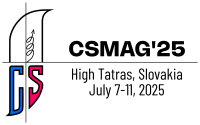Speaker
Description
The neutron and, more recently, X-ray spectroscopy have been standard workhorses for investigations of condensed matter dynamics at atomic resolution. Nevertheless, the inherently weak interaction of both probes with matter, accompanied by the tiny flux densities of neutron beams and by the huge Xray photon energy as compared to the energy scale of elementary excitations in condensed matter, have limited their implementation to simple scattering, leaving no options for analogies to optical experiments with coherently split beams.
Experiments using synchronized pulsed Xray and laser beams to investigate the time evolution of non-equilibrium states of condensed matter, both in the structural and in the magnetic domains, are quickly becoming routine at XFEL (X-ray Free Electron Lasers) beams exhibiting picosecond time-structures, accompanied by extreme transversal coherence (e.g. [1]). With neutrons the progress is slower, but reports on successful attempts of time-resolved work have appeared recently as well [2,3] and, after all, a dedicated pump-probe setup has been developed and tested at the SNS Hyspec spectrometer at the ORNL [4].
In this presentation we shall recall the basic principles of scattering theory based on time-dependent correlation functions and review the present state of neutron experimental techniques addressing transient processes in matter, their principal limitations and development opportunities.
References
[1] Y. Lee et al., “A comparative review of time-resolved x-ray and electron scattering to probe structural dynamics,” Structural Dynamics, vol. 11, no. 3. AIP Publishing, May 01, 2024. https://doi.org/10.1063/4.0000249
[2] M. Wang et al., “Optically Induced Static Magnetization in Metal Halide Perovskite for Spin‐Related Optoelectronics,” Advanced Science, vol. 8, no. 11. Wiley, May 02, 2021. https://doi.org/10.1002/advs.202004488
[3] Y. Wang et al., “Monopolar and dipolar relaxation in spin ice Ho 2 Ti 2 O 7,” Science Advances, vol. 7, no. 25. American Association for the Advancement of Science (AAAS), Jun. 18, 2021. https://doi.org/10.1126/sciadv.abg0908
[4] C. Hua et al., “Implementation of a laser–neutron pump–probe capability for inelastic neutron scattering,” Review of Scientific Instruments, vol. 95, no. 3. AIP Publishing, Mar. 01, 2024. https://doi.org/10.1063/5.0181310

